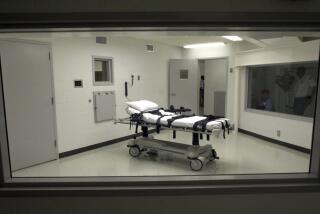Groups Decry Rise in Saudi Executions : Middle East: As many as eight people have been beheaded in a single day. A drug crackdown appears to be behind the dramatic increase in the kingdom.
- Share via
CAIRO — A dramatic increase in executions in Saudi Arabia this year has alarmed human rights groups and refocused international attention on the kingdom’s controversial judicial system.
Estimates by human rights groups that closely monitor events there place the total between 90 and 100 through May 2. London-based Amnesty International said that figure exceeds the 53 executions known to have been carried out in 1994 and the 88 recorded in 1993, which also prompted complaints by human rights advocates.
Saudi Arabia, which does not release official figures on executions, has a population of about 17 million, somewhat more than half that of California.
The number of executions--generally public beheadings by sword--has increased even though none took place in February, in which the Muslim holy month of Ramadan falls; the capital punishment was also halted in part of May for the annual hajj (the pilgrimage to Mecca) and the Feast of the Sacrifice, Eid al Adha, which ended Saturday.
As many as eight people have been beheaded in a single day, and executions, usually carried out on Fridays after the midday prayer, have been extended to other days of the week.
Saudi law, based in Islamic teachings, or Sharia, permits capital punishment for various offenses, including murder, rape, adultery and sabotage.
A rise in executions for drug trafficking, made a capital offense in the kingdom in 1987, appears to be behind the recent figures.
A large number of the condemned in drug cases are foreigners, generally workers from Asia and Africa, according to reports from the kingdom.
Saudi Arabia makes public few details of the execution cases.
Amnesty International, however, has aimed a barrage of criticism at the practice since an April 20 statement declaring the organization “gravely concerned at the sharp increase.”
Last week, an Amnesty International representative and a staff member from the Saudi Embassy in London debated the issue on British Broadcasting Corp. radio.
Much of the criticism stems from the nature of Saudi judicial proceedings, in which, Amnesty argues, “internationally agreed safeguards for prisoners facing the death sentence are completely ignored.”
Prisoners are not allowed lawyers at their non-jury trials, and Amnesty contends that “confessions” are often extracted by torture.
There is an appeal process, but it is hasty by U.S. standards. Although Amnesty has said some foreign prisoners are detained without notification of their embassies, the Saudi government denies this.
Officials in Saudi government offices, including the embassy in Washington, were unavailable for comment because of the Islamic holiday. But in an earlier statement, issued through the official Saudi Press Agency, Prince Nayif ibn Abdulaziz, the interior minister, dismissed complaints as those of outsiders interfering with Saudi internal affairs.
“We are carrying out the rules of God, the great and the almighty, and we will not pay attention to those who say anything about it,” he said. “Executions are not decided by one person but are issued through a legal system based on God’s holy book (the Koran).”
Ghazi Alogasaibi, the Saudi ambassador to London, also issued a statement, saying the increase in executions “simply indicates how this evil, international drug mafia continues to spread its evil activities. . . . Saudi Arabia will not allow itself to become a safe haven for drug traffickers to please Amnesty International or anybody else. Whole societies have been destroyed by the evil of drugs, and Saudi Arabia is not going to join their ranks.”
The executions are only one sign of rising concern about drug abuse on the Arabian Peninsula.
The Kuwaiti Parliament approved the death penalty for selected drug offenses last month, and the legislation is awaiting ratification by the emir, Sheik Jabbar al Ahmed al Sabah. The United Arab Emirates also executes drug smugglers.
In addition, sermons during the hajj this month included admonitions against drug use.
Although beheading by sword is the most common method of execution in Saudi Arabia, the law also provides for death by firing squad and, very rarely, by stoning.
(BEGIN TEXT OF INFOBOX / INFOGRAPHIC)
Capital Punishment
The total number of executions in Saudi Arabia in recent years, as estimated by Amnesty International. Saudi Arabia does not release official figures. 1990: 15 1991: 29 1992: 66 1993: 88 1994: 54 1995*: 90-100 * Through May 2.
More to Read
Sign up for Essential California
The most important California stories and recommendations in your inbox every morning.
You may occasionally receive promotional content from the Los Angeles Times.










